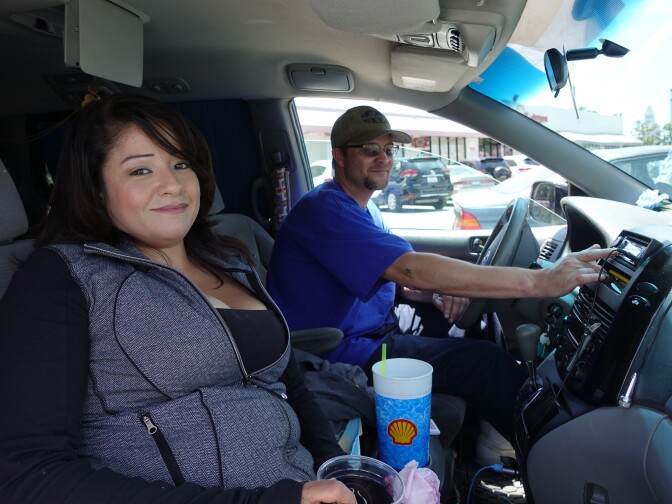This story is free to read because readers choose to support LAist. If you find value in independent local reporting, make a donation to power our newsroom today.
This archival content was originally written for and published on KPCC.org. Keep in mind that links and images may no longer work — and references may be outdated.
In hot Los Angeles rental market, veterans with housing vouchers are being turned away
Any Angeleno who’s hopped online lately looking to rent a new apartment knows that the Southern California housing market is tight. There’s not a lot of inventory, and what is available costs a pretty penny. Selling yourself as a desirable tenant is part of the house-hunting dance.
Some advocates say military and veteran status can work against applicants trying to lock down leases in this competitive rental environment.
“This rental market is not quite as welcoming as it used to be, and we’ve seen examples of landlords discriminating against veterans and people on active duty,” said State Senator Jerry Hill of San Mateo and Santa Clara. “When I see an injustice, I get mad.”
Hill introduced SB 1427 last month. It aims to protect servicemembers from housing discrimination by adding “veteran and military status” to a list of protected classes, and changing the way landlords treat veteran rental vouchers.
California law prohibits housing discrimination based on things like race, religion, disability, gender or sexual orientation, but there’s currently nothing on the books about military service.
VOUCHER IN HAND BUT NOWHERE TO GO
Apartment hunting is tough for everyone in Los Angeles, and Army veteran Adam John Halvorsen and his girlfriend, Angela Del Castillo, know the struggle all too well. They’ve spent 5 months looking for a place to live.
For now, they’re living in her van, driving all over town to whatever odd jobs Halvorsen can piece together, spending way too much on gas.
On a recent Friday afternoon, Halvorsen flipped through pages upon pages of apartments they’ve applied to. “We’ve been looking for so long that I can’t afford it anymore,” he said.
The couple is broke. But they do have a HUD-VASH voucher in-hand worth a little over $1,800.
These vouchers are a joint benefit from the Department of Housing and Urban Development and the Department of Veterans Affairs. They combine cash for rent on the private market with check-ins from a VA caseworker, healthcare, and services like substance abuse treatment. The package has proven successful at moving chronically homeless vets off the street. The Department of Housing and Urban Development says nationwide, more than 87,000 vouchers have been awarded and approximately 144,000 homeless veterans have been served by the vouchers since 2008.
Halvorsen and Del Castillo figured their voucher was plenty to cover a 1-bedroom in L.A. And not too long ago, they thought they’d found their apartment in a building in North Hollywood. It was even going well with the landlord, who was on a list of housing authority-approved renters.
“It was really nice,” Del Castillo said. “But then I told him about the voucher, and he’s like, ‘what? Section 8? No no no. No more section 8. No no no no no.’ And he started walking to the door.”
The couple said they're getting this reaction all the time from landlords. With Southern California’s low vacancy rate, there are plenty of other renters knocking on their doors.
“They’re really picky,” Del Castillo said. “And there’s so many people out here, they can be picky.”
CUTTING IN LINE
If HUD-VASH vouchers go unused, they expire. It generally happens after 120 days unless the veteran gets a hardship extension. KPCC previously reported on the difficulty veterans face tracking down landlords willing to take HUD-VASH rental vouchers. Earlier this year, a sting by Washington’s attorney general uncovered dozens of properties in ten cities across the state that were flatly refusing to rent to veterans with vouchers.
“That’s not fair, it’s not right, and it’s not really as I would look at it the American way,” Senator Hill said. His bill would classify HUD-VASH vouchers as income in California, theoretically putting vets on an equal footing with other would-be renters.
“No one should be able to discriminate against a veteran just because they have a voucher,” Hill said.
The California Apartment Association (CAA), which represents apartment owners and developers, opposes that provision of the SB 1427. It argues the law would overburden housing authorities by forcing all rental property owners to participate in the voucher program. And critics say it’s not fair for veteran vouchers to be prioritized over Section 8, where renters can be stuck on a waiting list for years.
“While protecting and caring for our veterans is important, SB 1427 would give veterans priority over low income families, individuals with disabilities, and students,” said Debra Carlton, Senior Vice President for Public Affairs with the CAA. “We believe tenants should all have an equal opportunity. This bill is basically allowing them to cut in line.”
UNDESIRABLE?
Even if veterans gain legal housing protections, there's still a big sticking point: convincing landlords that participating in the HUD-VASH program is worth the hassle in Southern California’s hyper-competitive rental market.
“A lot of times we find units, but they’re in bad locations, you know, or the building is not up to code,” said Larry Gray, a housing navigator for the non-profit New Directions for Veterans.

Gray served on an aircraft carrier in the Navy in the 1980s. Now he helps other vets find permanent housing in Southern California—including veterans with vouchers.
Finding a place that will accept a voucher is a start, but there are more hoops to jump through. The landlord has to submit paperwork called a “Request for Tenancy Approval Form” to the local housing authority, and the apartment has to pass an extra inspection. Then the housing authority negotiates over the price of rent.
“And that’s time consuming,” Gray said. “Landlords complain that the process takes too long.”
Gray says he also confronts a lingering stigma surrounding veteran status when he's trying to make a housing match between landlord and tenant. “I’ve been asked straight forward: What type of mental illness does he have? Or is he suffering from PTSD?” Gray said, adding he wishes there was more education for landlords to better understand the HUD-VASH process and its wraparound services designed to keep veteran renters on-track.
Adam Halvorsen is skeptical legislation out of Sacramento will fix the problem. He thinks landlords will find other ways to skip over homeless veterans, maybe by eliminating low credit scores.
Months of searching, application fees, and the price of gas are exhausting the couple’s resources. Once in a while they stop by to use the shower at Del Castillo’s father’s place. But Halvorsen said it feels like they’re running out of favors.
“Even if you have a family here or friends or people in your corner, how long are they gonna help you?” Halvorsen said. “Or how long can you even keep asking for their help?”









